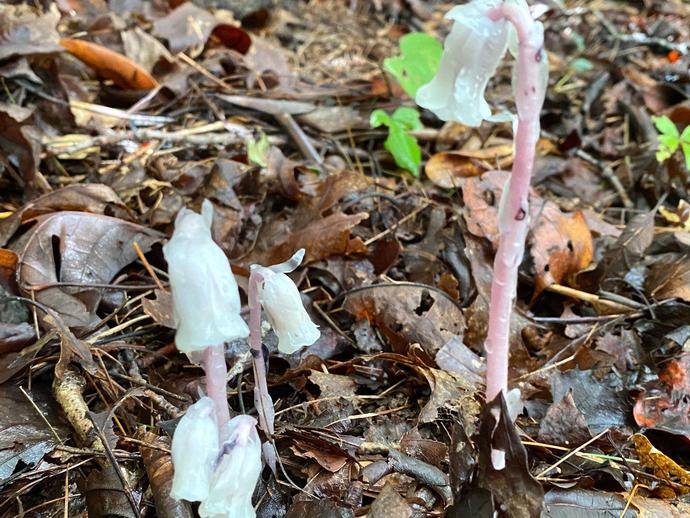October 2, 2020
I realize the suspense has been unbearable, but today I can finally reveal my number one favorite find from Saturday's Virginia BioBlitz 2020! This is Monotropa uniflora, also known as Indian pipe or ghost pipe, and it is a very unusual plant!
Indian pipe is white or pinkish-white in color because it doesn't contain chlorophyll, which is what gives plants their green color. So how does it absorb sunlight and undergo photosynthesis, you might wonder? The answer: it doesn't!
Indian pipe is a parasitic plant, and it gets its energy by parasitizing certain types of fungi. The fungi that it parasitizes are parasites themselves, and they get THEIR energy from tree roots, especially those of beech trees. The trees get their energy through photosynthesis. Essentially, Indian pipe has found the single most convoluted way possible to get its energy from the sun.
One of the benefits of this complicated relationship is that Indian pipe doesn't need sunlight to grow, so it can thrive in the dark understory of a thick forest. On the other hand, because it has very specific requirements -- acidic soil, specific types of trees, and specific types of fungus that grow on the roots of said specific trees -- Indian pipe is not commonly encountered despite its fairly wide range.
If you'd like to find Indian pipe yourself, it flowers from early summer through early fall, and can usually be spotted in bloom a few days after a good rain. It can often be found in damp, dark parts of the forest, especially near beech trees. Keep an eye peeled, because it's definitely a cool find!
ABOUT #BenInNature
Social distancing can be difficult, but it presents a great opportunity to become reacquainted with nature. In this series of posts, Administrator of Science Ben Williams ventures outdoors to record a snapshot of the unique sights that can be found in the natural world. New updates are posted Monday - Friday, with previous posts highlighted on the weekends.
NATURE PHOTO IDENTIFICATIONS If you discover something in nature that you would like help identifying, be sure to message us right here on Facebook with a picture (please include location and date of picture) and we'll have our experts help you identify it!

 Hours & Admissions
Hours & Admissions Directions
Directions

